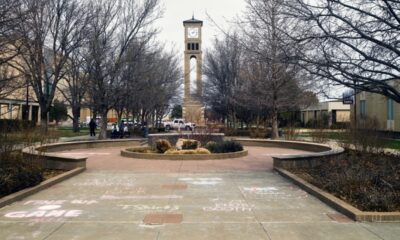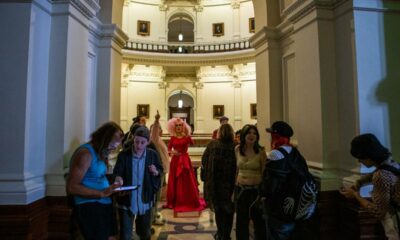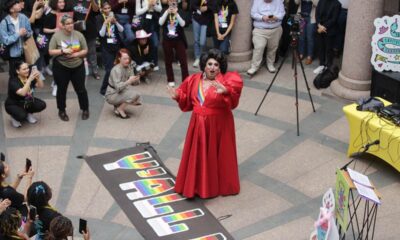Amarillo
West Texas A&M University president sued after canceling student drag show
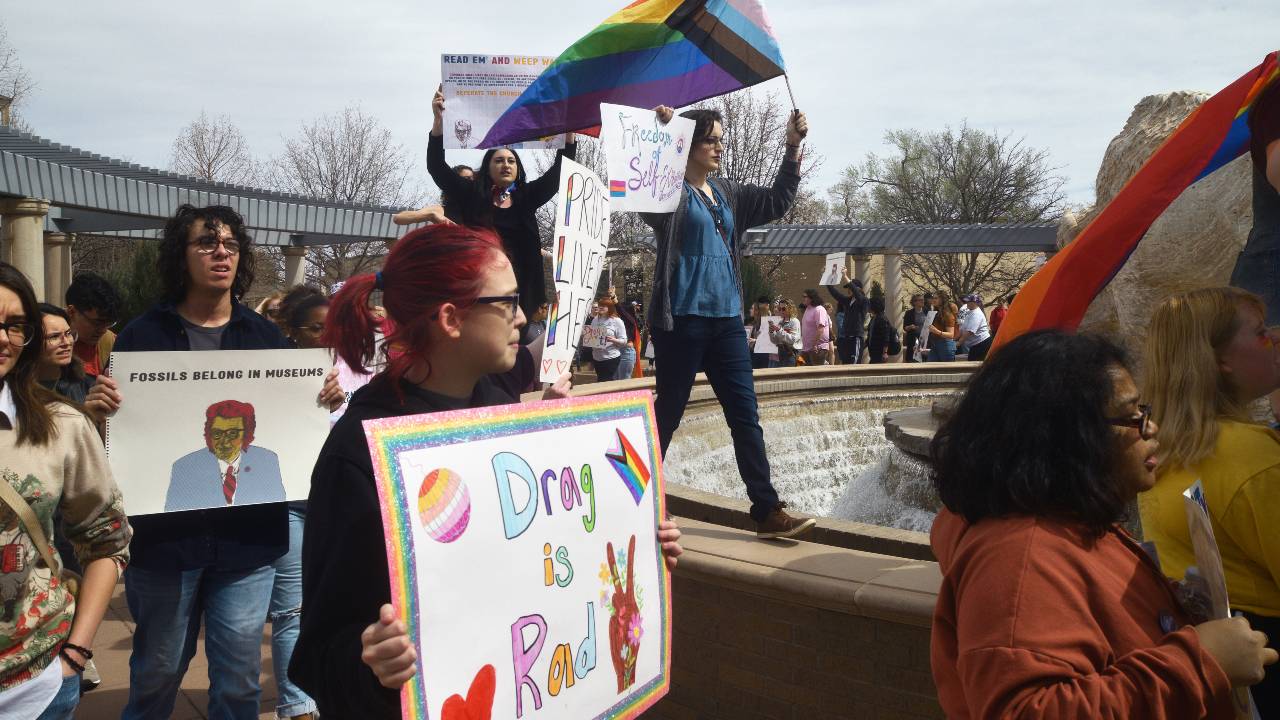
This article originally appeared in The Texas Tribune
 An LGBTQ student group at West Texas A&M University and its two student leaders have filed a lawsuit against university president Walter Wendler, alleging he violated their First Amendment rights when he canceled a planned campus drag show earlier this week because he believed the shows degrade women.
An LGBTQ student group at West Texas A&M University and its two student leaders have filed a lawsuit against university president Walter Wendler, alleging he violated their First Amendment rights when he canceled a planned campus drag show earlier this week because he believed the shows degrade women.
The lawsuit comes after days of protests each day this week, calling for Wendler to reinstate the drag show and step down as president. More than 10,000 people have signed a student petition in support of the drag show. Meanwhile, local conservative leaders have encouraged the West Texas community to attend the protests and express their support for Wendler.
In a lawsuit filed Friday in U.S. District Court in Amarillo, lawyers for the plaintiffs argue that Wendler is “openly defying the Constitution.”
“Whether students gather on campus to study the Bible, host a political talk, or put on a drag show for charity, the First Amendment prohibits public university officials from suppressing the students’ expression simply because the administrator (or anyone else) finds the message offensive,” the lawsuit reads.
The Foundation for Individual Rights and Expression, a national campus free speech group, is representing the students. Lawyers from FIRE sent letters to the university and system leadership this week asking them to reinstate the show. In the lawsuit, they say no one responded to their demands.
The students want the event reinstated and ask the court to prohibit university administrators from violating their free speech rights. On Friday afternoon, FIRE also filed a temporary restraining order to stop Wendler from taking action against the students’ drag show. The case will go before Judge Matthew Kacsmaryk, the federal judge who is also hearing the anti-abortion challenge to the Food and Drug Administration’s approval of mifepristone, an abortion-inducing drug.
The lawsuit was also filed against Christopher Thomas, vice president of student affairs at the public university in Canyon, as well as Texas A&M University System Chancellor John Sharp and the system’s board of regents. In the lawsuit, lawyers for the plaintiffs argue the system leaders have not stopped Wendler from violating students’ freedom of speech.
Spokespeople for the university and system declined to comment.
The campus LGBTQ group called Spectrum was planning to hold the show, called A Fool’s Drag Race, on March 31, the day before April Fool’s Day. Students reserved Legacy Hall on campus and started to advertise the event, stating that all proceeds would be donated to the Trevor Project, an LGBTQ suicide-prevention group.
According to the lawsuit, West Texas A&M administrators helped the student group navigate the campus event approval process throughout February and March.
Then, the students allege that administrators told them on March 20 the drag show was canceled because Wendler disapproved. Wendler sent a letter to the campus community Monday announcing drag shows are banned on campus.
In the letter, the president said drag shows degrade women because they “stereotype women in cartoon-like extremes for the amusement of others and discriminate against womanhood.”
He argued in his letter that allowing drag shows goes against the U.S. Equal Employment Opportunity Commission’s purpose, saying they’re inappropriate even if they’re not illegal.
Students rejected Wendler’s assertions and said he mischaracterized the art form.
Drag shows frequently feature men dressing as women in exaggerated styles and have been a mainstay in the LGBTQ community for decades. Drag performers say their work is an expression of queer joy — and a form of constitutionally protected speech about societal gender norms.
Dan Rogers, chair of the Amarillo GOP, emailed members Thursday encouraging them to “support Dr. Walter Wendler, President of WTAMU in his stand against evil.”
A second online petition supporting Wendler has around 4,500 signatures as of Friday morning.
Disclosure: Texas A&M University, Texas A&M University System and West Texas A&M University have been financial supporters of The Texas Tribune, a nonprofit, nonpartisan news organization that is funded in part by donations from members, foundations and corporate sponsors. Financial supporters play no role in the Tribune’s journalism. Find a complete list of them here.
The Texas Tribune is a nonpartisan, nonprofit media organization that informs Texans — and engages with them – about public policy, politics, government and statewide issues.

Amarillo
Appeals court considers whether West Texas A&M drag show was unconstitutionally banned
University President Walter Wendler canceled a drag performance last year, claiming such shows “denigrate and demean women.”
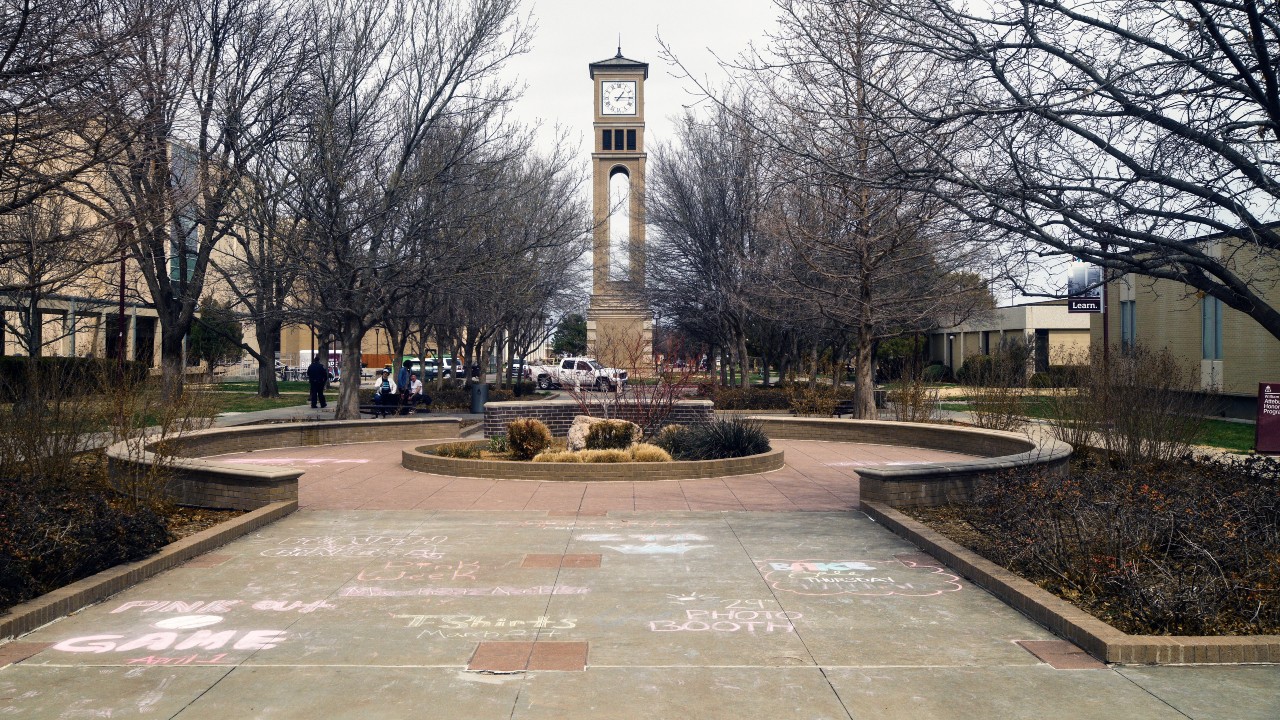
This article originally appeared in The Texas Tribune
 A federal appeals court considering whether West Texas A&M University’s president violated the First Amendment when he canceled a campus drag show last year focused many of their questions Monday on a U.S. Supreme Court ruling that upheld campus non-discrimination policies.
A federal appeals court considering whether West Texas A&M University’s president violated the First Amendment when he canceled a campus drag show last year focused many of their questions Monday on a U.S. Supreme Court ruling that upheld campus non-discrimination policies.
But the panel of three judges used that 2010 case — which said universities can require groups to admit LGBTQ+ students — to suggest that school officials could also ban drag shows because some people find the performances offensive to women.
A lawyer representing a group of West Texas A&M students who’ve twice attempted to host a drag show on campus argued before the 5th U.S. Circuit Court of Appeals Monday that President Walter Wendler discriminated based on viewpoint and censored speech when canceling the performances.
In March 2023, Wendler banned drag shows in response to a student fundraiser that featured drag performers. The president argued the performances “denigrate and demean women,” and shouldn’t be allowed on the public university’s campus.
In September, a federal judge said Wendler acted within his authority to cancel the drag show. In his opinion, U.S. District Judge Matthew Kacsmaryk wrote, at “this point in Free Speech jurisprudence, it is not clearly established that all ‘drag shows’ are categorically ‘expressive conduct.’”
Last month, students with WT Spectrum, the student group at the university, hoped to hold another drag show on campus — to show support for the LGBTQ+ community in a staunchly conservative corner of Texas.
With Wendler’s campus-wide ban still in place, the Supreme Court declined to intervene and the president again ordered the fundraiser from taking place.
The panel of judges hearing the appeal Monday were James Dennis, James Ho and Leslie Southwick.
Many of their questions centered around Christian Legal Society v. Martinez, a case in which the Supreme Court upheld a policy of the University of California, Hastings College of the Law, that bars student groups from excluding members based on status or beliefs.
In 2010, the Supreme Court affirmed that Hastings’ policy does not violate the First Amendment rights of CLS, a group of students that wanted to be officially recognized on campus while not allowing people who engage in “unrepentant homosexual conduct” from joining.
The 5th Circuit judges Monday seemed to suggest that Wendler’s ban was no different from the policy at the center of the 2010 Supreme Court case. One of the judges, who didn’t identify themselves before speaking, asked if plaintiffs intended to use the case in question to overturn CLS.
“Maybe we should overturn CLS?” one of three judges said. “Many people would like CLS overturned.”
Ho equated the policy upheld in CLS with Wendler’s drag ban. He said both intend to make everyone feel included, but the policies have the consequence of targeting one group. In CLS’ case, he said that Christians were singled out on Hastings’ campus for not allowing LGBTQ+ individuals to join. Ho said that previous groups on Hastings’ campus could exclude members, but CLS was singled out by the university’s non-discrimination policy.
JT Morris, senior attorney for the Foundation for Individual Rights and Expression who represented the students, argued that the judges were comparing “apples to oranges” between the two cases.
Morris argued CLS is about a content-neutral policy, while Wendler was clearly discriminating based on viewpoint.
“The First Amendment does not allow the government to use the subjective term ‘offensive’ to restrict speech,” Morris said.
Joseph N. Mazzara, a lawyer with the Texas Attorney General’s Office who represented Wendler, said the students had not suffered any injury as a result of the no-drag policy because there was no future event featuring drag performers planned. Additionally, Mazzara said Wendler’s policy carried no criminal penalties and students could host drag performances off campus.
Mazzara said Wendler’s ban was not a free speech violation, but rather it was akin to banning certain conduct, like skateboarding on the grounds of a monument. He said drag shows constituted conduct, not speech.
“They’re able to do everything they want to do, they’re able to say all the speech they want to [say],” Mazzara said, referring to the student group WT Spectrum. “They just can’t do this one particular thing in this one particular place.”
A judge asked Mazzara how the university would have treated drag shows put on by other student groups, such as a fraternity. The judges seemed to agree with Mazzara that Wendler’s restriction did not target a specific viewpoint.
“If a Christian legal group wanted to have a ‘Drag for Jesus’ event that would also be banned,” Mazzara said.
One judge suggested that some drag shows are offensive to the transgender community, and thus Wendler’s ban would equally protect that population from offensive performances.
Allison Marie Collins, another lawyer from the Attorney General’s Office representing other defendants named in the lawsuit, argued the appellate judges should not impose any restrictions on Texas A&M system Chancellor John Sharp or West Texas A&M Vice President for Student Affairs Christopher Thomas. She argued an injunction against Sharp or Thomas would be overbroad, because it’s clear that only Wendler has acted to stop these shows.
“Neither Chancellor Sharp nor Dr. Thomas have remotely engaged in viewpoint discrimination, exclusion from a public forum or a prior restraint complaint to speech,” Collins said.
In his rebuttal, Morris argued the plaintiffs have standing over Sharp because he has the authority over Wendler to put an end to this restriction on free speech.
“He has the authority to do what’s best for the campus,” Morris said of Sharp. “He should have put an end to this prior restraint, which shouldn’t have lasted a day, and has now lasted a year.”
Disclosure: Texas A&M University and West Texas A&M University have been financial supporters of The Texas Tribune, a nonprofit, nonpartisan news organization that is funded in part by donations from members, foundations and corporate sponsors. Financial supporters play no role in the Tribune’s journalism. Find a complete list of them here.
The Texas Tribune is a nonpartisan, nonprofit media organization that informs Texans — and engages with them – about public policy, politics, government and statewide issues.
Amarillo
West Texas A&M University president cancels student drag show, saying it degrades women
Students and First Amendment lawyers say President Walter Wendler’s portrayal of drag shows is off base and the cancellation violates free-speech rights.
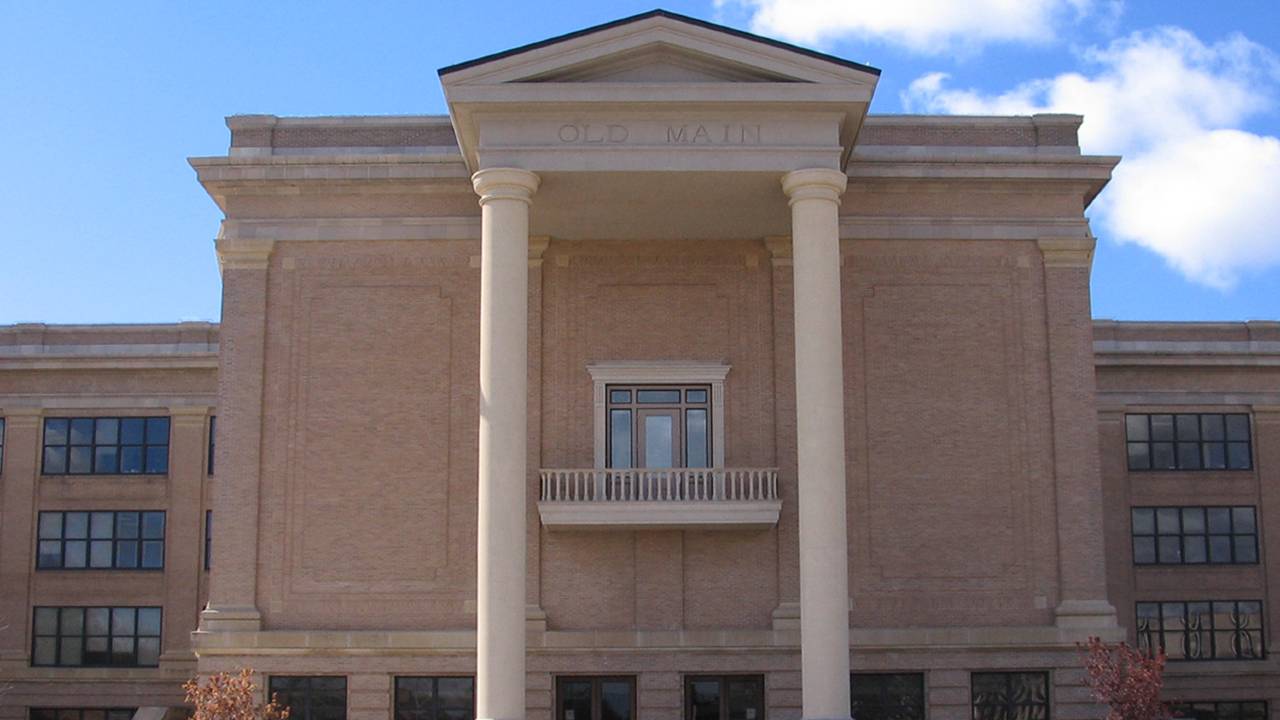
This article originally appeared in The Texas Tribune
West Texas A&M University President Walter Wendler is drawing ire for canceling a student drag show, arguing that such performances degrade women and are “derisive, divisive and demoralizing misogyny.”
Students and First Amendment lawyers reject those assertions, calling his comments a mischaracterization of the art form. They also argue that the cancellation violates students’ constitutional rights and a state law that broadly protects free speech on college campuses, potentially setting the university up for a lawsuit.
“Not only is this a gross and abhorrent comparison of two completely different topics, but it is also an extremely distorted and incorrect definition of drag as a culture and form of performance art,” students wrote in an online petition condemning Wendler’s letter and urging him to reinstate the show.
Students plan to protest every day this week on the campus in the small West Texas city of Canyon, according to a social media post by the Open and Affirming Congregations of the Texas Panhandle.
“Drag is not dangerous or discriminatory, it is a celebration and expression of individuals,” student Signe Elder said in a statement. “Amidst the current climate of growing anti-trans and anti-drag rhetoric, we believe that it is important now more than ever to stand together and be heard.”
Elder is part of a group of students who have organized under the name Buffs for Drag, referring to the school’s buffalo mascot, to protest Wendler’s actions.
Drag shows frequently feature men dressing as women in exaggerated styles and have been a mainstay in the LGBTQ community for decades. Drag performers say their work is an expression of queer joy — and a form of constitutionally protected speech about societal gender norms.
But Wendler said drag shows “stereotype women in cartoon-like extremes for the amusement of others and discriminate against womanhood” in a Monday letter that was first obtained by Amarillo news site MyHighPlains.com. Wendler said the drag show was organized to raise money for The Trevor Project, a nonprofit that works to reduce suicides in the LGBTQ community. Wendler noted that it is a “noble cause” but argued the shows would be considered an act of workplace prejudice because they make fun of women.
“Forward-thinking women and men have worked together for nearly two centuries to eliminate sexism,” Wendler wrote. “Women have fought valiantly, seeking equality in the voting booth, marketplace and court of public opinion. No one should claim a right to contribute to women’s suffering via a slapstick sideshow that erodes the worth of women.”
His comments and decision to cancel the campus drag show come amid surging uproar over the lively entertainment as far-right extremist groups have recruited conservatives to protest the events, claiming that drag performances are sexualizing kids.
Republican Texas lawmakers have also homed in on the performances with a handful of bills that would regulate or restrict drag shows, including some legislation that would classify any venue that hosts a drag show as a sexually oriented business, regardless of the show’s content. On Thursday, a Senate committee will debate a scaled-back bill that would impose a $10,000 fine on business owners who host drag shows in front of children — if those performances are sexually oriented. The bill defines a sexually oriented performance as one in which someone is naked or in drag and “appeals to the prurient interest in sex.”
Rachel Hill, government affairs director for LGBTQ advocacy group Equality Texas, said drag doesn’t mock women. Instead, she said, it’s an art form that allows performers to explore their gender expression and take back power from what she said can be stifling gender norms.
“Drag has always been a way for people who don’t easily fit into the gender binary to embrace different facets of themselves,” Hill said in a statement to The Texas Tribune. “Womanhood comes in all shapes and sizes and is what we make of it. That’s what makes drag so powerful.”
West Texas A&M student groups were organizing the drag show, called “A Fool’s Drag Race,” for months. The LGBTQ student group Spectrum advertised the show on its Instagram page, encouraging people to sign up to perform.
Wendler argued in his letter that the West Texas A&M drag show goes against the U.S Equal Employment Opportunity Commission’s purpose, saying it’s inappropriate even if drag shows are not illegal.
A lawyer for the national campus free speech group Foundation for Individual Rights and Expression rejected that argument as “nonsense.”
“The only prejudice in play here is his,” said lawyer Alex Morey, arguing that Wendler has violated state and federal law by canceling the show.
In a statement to The Texas Tribune, Morey said that performances on campus such as drag shows are protected by the First Amendment.
“By unilaterally canceling the event because he personally disapproves of the views it might express, WTAMU’s president appears to have violated both his constitutional obligations and state law,” Morey said. “It’s really surprising how open he is about knowingly violating the law, especially because government officials who violate clearly established First Amendment law will not retain qualified immunity and can be held personally liable for monetary damages.”
The students who started the petition also accused Wendler of violating university policy, which states the school can’t deny student groups any benefits “on the basis of a political, religious, philosophical, ideological, or academic viewpoint expressed by the organization or any expressive activities of the organization.”
In 2019, Texas lawmakers passed a law that required universities to allow any person to engage in free-speech activities on campuses. The law passed with broad bipartisan support.
A West Texas A&M spokesperson said Tuesday morning that Wendler did not have any further comments. The Texas A&M University System, which oversees West Texas A&M, also declined to comment.
This is not the first time Wendler has been criticized for his comments related to people in the LGBTQ community. When he was chancellor of Southern Illinois University, he was criticized for pushing back on the board’s decision to extend certain medical benefits to same-sex partners, saying the measure would encourage “sinful behavior,” according to a local newspaper at the time.
Last year, Texas A&M University in College Station drew criticism from students when the office of student affairs announced it would no longer sponsor Draggieland, the annual drag show competition that started in 2020. Students held the performance last year after raising money through private donations. This year’s event is scheduled for April 6.
Alex Nguyen contributed to this story.
Disclosure: Equality Texas, Texas A&M University, Texas A&M University System and West Texas A&M University have been financial supporters of The Texas Tribune, a nonprofit, nonpartisan news organization that is funded in part by donations from members, foundations and corporate sponsors. Financial supporters play no role in the Tribune’s journalism. Find a complete list of them here.
The Texas Tribune is a nonpartisan, nonprofit media organization that informs Texans — and engages with them – about public policy, politics, government and statewide issues.

